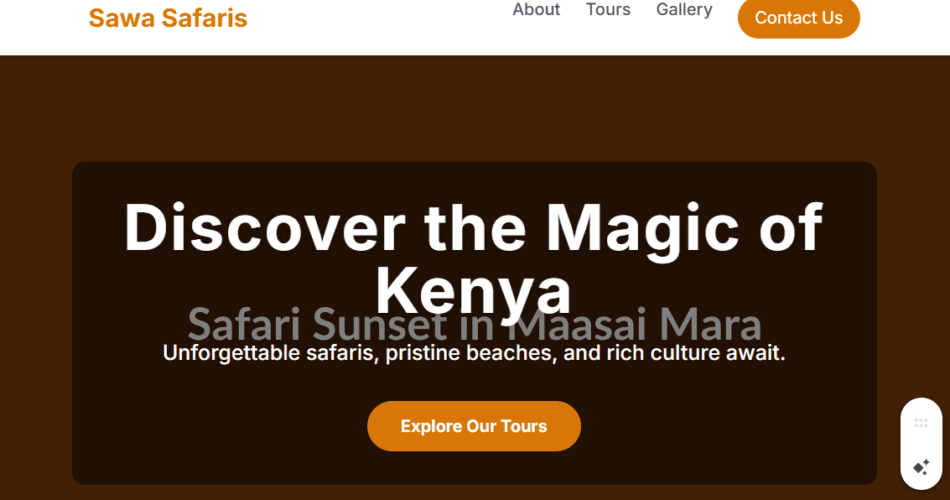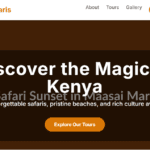SEO for Tourism Businesses in Kenya
- Delivery Time2 Weeks
- English levelProfessional
- LocationUSA, United Kingdom, United Arab Emirates, New York, Nairobi, Kilimani, Kenya, Dubai, CBD Nairobi, Canada, Australia
Service Description
The cost of SEO for Tourism Businesses in Kenya is 80000KES per month.Get SEO for Tourism Businesses in Kenya at a price of 30000KES per month at Black shepherd Technologies.
Ready to explore Kenya? Discover unforgettable safari adventures, pristine beaches, and vibrant cultural experiences. Our expert-led tours offer personalized itineraries and seamless travel planning. Start your Kenyan journey today.
Kenya’s tourism industry is a vibrant and essential pillar of its economy, renowned worldwide for its unparalleled natural beauty, diverse wildlife, and rich cultural heritage. From the iconic safari landscapes of the Maasai Mara to the pristine, sun-drenched beaches of the Indian Ocean coast, Kenya offers a travel experience that is both exhilarating and deeply authentic. In today’s highly competitive and digitized world, an effective Search Engine Optimization (SEO) strategy is not just an advantage; it is a necessity for any tourism business in Kenya aiming to thrive and attract a global audience. This comprehensive guide delves into the core components of SEO, tailored specifically to the unique dynamics of the Kenyan tourism market, and outlines a robust strategy to help businesses of all sizes—from tour operators and hotels to eco-lodges and travel agencies—increase their online visibility, drive organic traffic, and ultimately, convert more bookings.
At the heart of a successful SEO campaign for a Kenyan tourism business lies a deep understanding of the target audience. Travelers today are more discerning and research-intensive than ever before. They use search engines to find specific experiences, read reviews, compare prices, and seek out authentic, local insights. Therefore, a successful SEO strategy must begin with meticulous keyword research. This isn’t just about targeting broad terms like “Kenya safari” or “Mombasa beach hotels.” Instead, it involves identifying long-tail keywords that capture the specific intent of a potential traveler. For example, a tour operator specializing in bird-watching might target “bird-watching tours Lake Nakuru,” while a luxury lodge could focus on “Maasai Mara luxury eco-lodge with infinity pool.” The inclusion of local keywords, such as “things to do in Nairobi” or “affordable safari packages from Diani,” is also crucial for capturing the attention of both international and domestic tourists.
Once a solid keyword strategy is in place, on-page optimization becomes the next critical step. This involves integrating these keywords naturally into the website’s content, including page titles, meta descriptions, header tags (H1, H2, etc.), and image alt text. A well-optimized website is not only easier for search engines to crawl and understand but also provides a better user experience. The website itself must be fast-loading, mobile-friendly, and easy to navigate. Given that a significant portion of travel research and bookings happens on mobile devices, especially in Kenya where mobile usage is high, a responsive website design is non-negotiable. High-quality visuals—stunning photos and videos of wildlife, landscapes, and happy travelers—are also paramount. These visuals not only improve user engagement but, when properly optimized with descriptive alt text, can also boost a website’s search engine rankings
Content marketing is another cornerstone of a robust SEO strategy for tourism. It’s about providing valuable, informative, and engaging content that answers the questions a potential traveler might have. This could take the form of a blog with articles like “The Ultimate Guide to a Kenyan Safari,” “Top 10 Hidden Gems in Kenya,” or “Essential Packing List for Your Trip to the Coast.” Creating destination guides, travel tips, and behind-the-scenes stories of the business can establish authority and trust, positioning the business as a knowledgeable and reliable source of information. This rich, evergreen content not only attracts organic traffic but also provides excellent opportunities for internal linking, further strengthening the website’s SEO.
Off-page SEO, which involves building a strong online reputation and authority, is equally important. This includes earning high-quality backlinks from reputable travel blogs, news outlets, and other relevant websites. Strategic collaborations with local travel bloggers and influencers can be a powerful way to generate buzz, create user-generated content, and earn valuable links. Furthermore, actively managing online reviews and a Google Business Profile is vital. Encouraging satisfied customers to leave positive reviews on platforms like TripAdvisor and Google Maps can significantly improve local search rankings and build social proof. A strong social media presence on platforms like Instagram and Facebook, where visually appealing content of Kenya’s breathtaking scenery and wildlife can be shared, helps to build a community and drive traffic back to the website.
Finally, an effective SEO strategy for a Kenyan tourism business is an ongoing process that requires continuous monitoring and analysis. Using tools like Google Analytics and Google Search Console to track key metrics such as organic search traffic, keyword rankings, and conversion rates is essential for making data-driven decisions. By regularly auditing the website for technical issues, updating content, and adapting to changes in search engine algorithms, a tourism business can ensure it remains competitive and visible in the dynamic digital landscape. In summary, by focusing on a holistic strategy that combines meticulous keyword research, technical on-page optimization, compelling content creation, and strategic off-page efforts, Kenyan tourism businesses can unlock their full online potential, attract more visitors, and turn their digital presence into a powerful engine for growth.
To succeed in Kenya’s competitive tourism landscape, a strategic SEO approach is essential. By consistently implementing a well-researched keyword strategy, optimizing your website for mobile users, and creating high-quality, engaging content, your business can significantly boost its online visibility. This proactive effort ensures you connect with a global audience, drive more direct bookings, and establish your brand as a trusted authority in the Kenyan travel market.








